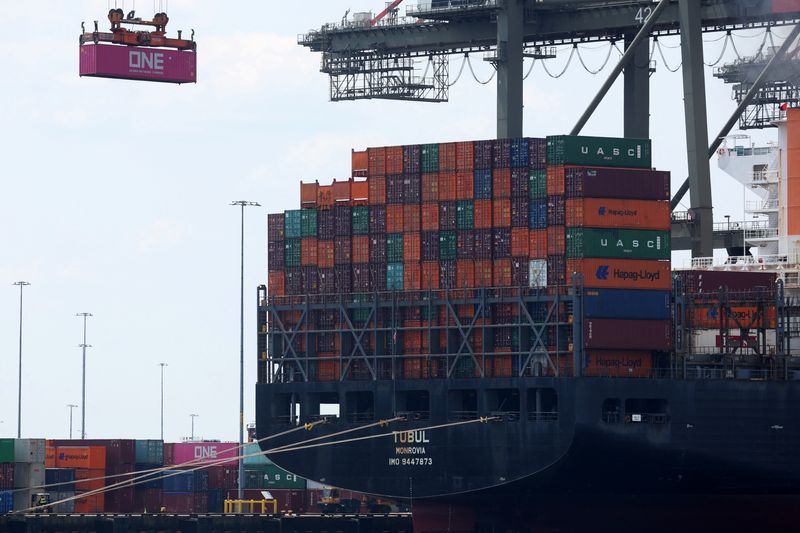By Lisa Baertlein
LOS ANGELES (Reuters) - U.S. presidential contender Donald Trump's plan to hike tariffs on imports if he is elected back to the White House in November would send cargo rates soaring and accelerate inflation, just like it did during his 2017-21 term, shipping and retail experts said.
Trump, who is running against Democratic Vice President Kamala Harris in the Nov. 5 election, has floated second-term plans for blanket tariffs of 10% to 20% on virtually all imports as well as tariffs of 60% or more on goods from China, in a bid to boost U.S. manufacturing.
In their debate on Tuesday, Harris called his proposal a "Trump sales tax" that will hurt working families, and has not released her own plan for tariffs. President Joe Biden has delayed implementing a proposed quadrupling of tariffs on Chinese electric vehicles to 100%, and a doubling of duties on semiconductors and solar cells to 50%. He had also proposed new 25% tariffs on lithium-ion batteries, steel and other goods.
"Trump's import tariffs are 'history repeating' and will cause a spike in ocean container shipping markets - with consumers picking up the cost," said Peter Sand, chief analyst at shipping pricing platform Xeneta.
The National Retail Federation, which represents Walmart (NYSE:WMT) and other companies that account for almost half of container shipping volume, is among the industry groups opposed to Trump's proposed tariffs.
"Tariffs are a tax on imports, operating like a sales tax wearing a mediocre disguise," NRF said earlier this week, noting that they drive up cost of goods for consumers and hurt workers and businesses.
"We're the poster child of how tariffs did not keep domestic production in place," said Matt Priest, CEO of the Footwear Distributors and Retailers of America, pointing out that 99% of shoes are now imported.
"We will be out there engaging with policy members and discussing how tariffs are paid by American consumers."
Ocean container shipping market rates spiked more than 70% after the Trump Administration announced new tariffs in 2018. The off-contract spot rate to ship a 40-foot (12.19-meter) container on the busy trade route from China to the U.S. West Coast jumped 75% to $2,604 between Jan. 1 and Nov. 1 that year, Xeneta said.

The tariffs also disrupted supply chains as shippers fought for extra cargo space on vessels, trucks and trains, while the landed goods swamped ports and warehouses, leading to higher prices for everything from furniture and footwear to steel.
Ocean freight rates are already elevated due to ongoing Iran-backed Houthi attacks on ships near the Suez Canal trade shortcut. That pressure, combined with a recent surge in holiday goods and industrial material imports recently sent the cost to ferry a 40-foot container from Shanghai to New York to $10,000.